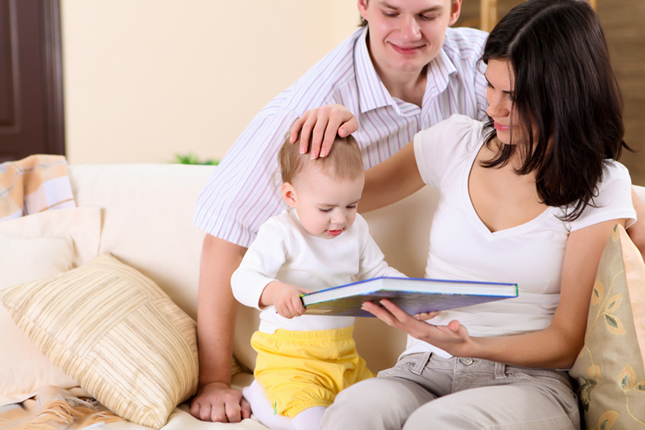Parent Savers
Teaching Your Kids Multiple Languages
[00:00:00]
Please be advised, this transcription was performed by a company independent of New Mommy Media, LLC. As such, translation was required which may alter the accuracy of the transcription.
SARAH CREEL: Children’s ability to learn languages is astonishing and has led many parents to push their children toward being multilingual. But there is because it’s part of their heritage or just because they want to give their kids a head start on an increasingly global marketplace. Many parents are dealing with the issue of teaching their kids multiple languages every day. I’m Sarah Creel, an associate professor at the University of California, San Diego, and this is Parent Savers Episode 79.
[Theme Music/Intro]
JOHNER RIEHL: Welcome everybody to Parent Savers broadcasting from the Birth Education Center of San Diego. Parent Savers is your weekly online on-the-go support group for parents of newborns, infants and toddlers. I’m your host Johner Riehl, thanks again to all of you for being loyal listeners and for checking us out each week. We love hearing from you on our Facebook page and our twitter accounts whenever we interact with you especially on our taping Saturdays where you can be a virtual panelist so come join the conversation. Follow us on Facebook, follow us on twitter and we’ll tweet out about great topics like we were having today. You can also join the Parent Savers club, our members could access to bonus content after each new show plus special giveaways. And as you know if you download the free Parents Savers app on the android and iTunes marketplace, you will get notified as soon as a new podcast is available usually on Wednesdays. So, thanks for joining us.
For today’s topic we’ve got a pretty full studio of myself and producer Erin and some panelists as well so we’ll go around the room so you guys know who the voices are that you are listening to and what our kid situation is. So we’ll go around the room and introduce ourselves. My name is Johner, I’m your host, and I have three boys, a 6 year-old, a 4 year-old and a 2 year-old Quinner, Whitaker and Zyler, and we only speak one language.
ERIN ESTEVES: The language of love.
JOHNER RIEHL: But Christina, her mom speaks Spanish, everyone thinks she speaks multiple languages, but she doesn’t. So anyway, Erin…
ERIN ESTEVES: My name is Erin Esteves and I am the producer, I am also known as OG Mama Sita. I have one boy who is just about to turn 2 and in our home, I speak to him in French, English and Spanish and we also sign, so, it’s kind of chaotic at times.
JOHNER RIEHL: I guess that treff , forget about sign language so maybe we are, we could talk about that a little bit
SUNNY GAULT: I’m Sunny Gault and I am the owner of New Mommy Media, which produces Parent Savers, Preggie Pals, Boob Group and Twin Talks. And I’ve got two little boys at home, Sayer and Urban. Sayer is my oldest, he’s 3, Urban’s about 18 months and I’m pregnant with twin identical girls due in December and one language in our house but we’re very upset about that because we live in San Diego, I feel like they should be bilingual at least in Spanish, I feel like a bad parent.
MARGARITA SALAZAR: Yes, Margarita Salazar, I’m an attorney by trade and a mommy full time. I have twin boys, are 3 and half years old and we mostly speak English. We were told that autistic children should be focused on one language and it’s very difficult for them to pick up two. I disagree with that little theory because my kids actually know a little bit of Spanish. We speak fluent Spanish in our home with my parents who are mostly primary Spanish speaking, and my kids also do some signing, but it’s not American sign language nor is it any other, I think, recognized sign language. I think it’s a specific where they use just sort of terms for specific things that my children want to get. So, it’s not a full language, it’s more of a tool so they’ll use, give more very specific symbols. But there a little bit of signing, not part to the extent at the Esteves house.
SARAH CREEL: Are these signs that they invented or are signs that they were taught?
MARGARITA SALAZAR: No they didn’t invent, although they do other things that they’ve invented. They’re actually from their program. They have an at home autism special aid program. And they picked up some language that they follow through at school
JOHNER RIEHL: We’ll talk about that I think a little bit more. Beston joins us as well..
BESTON BARNETT: My name is Beston Barnett, I’m a furniture maker and a primary caregiver of a 9 year-old. He is named Django, he speaks both Spanish and English quite fluently. My wife Andrea, born in Mexico, speaks to him only in Spanish or at least that was originally our rule but rules have long since gone. I guess all of our hard work is done at this point where our 9 year-old sort of all worked. I’m here for the post mortem I guess.
JOHNER RIEHL: And then Sarah, our expert…
SARAH CREEL: Hi, I’m Sarah Creel, I just turned 36. I’m a professor at UC San Diego. I currently have zero children, although I do have one cat.
[Theme Music/Intro]
JOHNER RIEHL: Before we jumped into today’s topic, were actually doing a news headline today and from time to time here on Parent Savers, we talk about an article that we see on the news or that maybe our listeners have seen and posted to our Facebook page and kind of give you our thoughts about it and usually they’re sort of funny, sometimes they’re shocking.
So today’s headline, and I’ll read it for everyone here in the studio. Is that Simon Cowell, and if you guys don’t know him, he is a television personality who’s on American Idol and now on the X-Factor, big in the UK and the US. His girlfriend is pregnant. He’s announced that when his baby is born, he doesn’t want to watch. He doesn’t want any part of it. He says he’ll be as close by as he can but he’s not interested on getting up close and personal with his girlfriend when she delivers the first child together. And here’s what he said, “I know it sounds awful but it’s a little like, you don’t want to go in to the restaurant while they’re making your dinner, you don’t want to go back into the kitchen. I just think there certain things that you shouldn’t see and this is one of them. I’ll be very close by but, No, I’ve no interest on being out there”.
SUNNY GAULT: So he’s not going to be like in the delivery room is what he’s saying?
JOHNER RIEHL: He doesn’t want to see the act of the birth happening.
SUNNY GAULT: Right, okay. So, it’s not that he’s not going to be there for his child overall, it’s that it’s just the birthing process
JOHNER RIEHL: He’s not saying like that but he doesn’t want to see how the sausages made as it were
SUNNY GAULT: He contributed to the sausage
JOHNER RIEHL: Exactly!
SARAH CREEL: He provided the sausage
JOHNER RIEHL: It’s one of those interesting things that, you know I hear dads sometimes too, that’ll brag like “Oh, but we changed one diaper” as you were one sports athlete that said something like that and it’s just surprising that we have evolved a little bit in this day and age that there’s now this kind of expectation that this new point is shocking whereas, you know, maybe, when I was born, or I mean when Erin was born, it would’ve been odd for dads be in the delivery room and be part of it and now he comes out with this and it’s a shocking and surprising standpoint
SUNNY GAULT: Are you really shocked that Simon Cowell said that doll?
ERIN ESTEVES: I don’t think I’m shocked because it’s Simon, one, but I think, anything that coming out of his mouth would be sort of as par for the course, you’ve heard him as a judge, I mean he’s said some pretty harsh things to some of the contestants
JOHNER RIEHL: I think I’m just so surrounded or maybe there’s two parents here or maybe with the community that I’m in that I’m surrounded by a lot of hands-on dads that couldn’t imagine not to be in that room to be there with their wife if they have a choice
ERIN ESTEVES: But also keep in mind that Simon Cowell is British, I’m not trying to generalize or sound pejorative in any way but it’s just that he comes from particular from his generation like you were talking about generational differences is he comes from a very kind of hands-off culture. Actually, I kind of commend him for coming forward and saying that because it is controversial because here, like you said, there are so many hands-on dad, but again I think it’s culturally specific. I think it’s American and particularly I think it’s kind of like the crunchy dads are more hands on.
MARGARITA SALAZAR: I’ll be very honest and if I get some e-mails I’d totally understand, but I didn’t want to see my own, delivery of my children. Not so much the down south part. I had a C-section and I was cut open in a very vivid way that I guess vivid was sort of parents who have gone through that experience is not pretty. It isn’t pretty. In fact, throughout the entire procedure I was nauseous and something I share with very few people, when the doctor came to hand me my child, one of the first babies that came out, I could not touch him, I couldn’t look at him because I felt like I was going to vomit. So I said “No, please don’t bring me, my baby, because I’m going to throw up”. They were bringing me the baby and I was physically sick. So, I totally get Mr. Cowell, I understand.
JOHNER RIEHL: So you totally think it’s a good idea, right?
MARGARITA SALAZAR: No, if you know you’re queasy, he knows atleast, I had no idea, I mean I was under the impression that I was going to be “Give me my baby!” …“Oh no please take him away”. I was so concerned about throwing up on my chart.
ERIN ESTEVES: See, that’s a really good point because she’s saying that he’s coming from stands of like he’s going to get sick, he’s afraid he’s going to pass out or faint. So he’s trying to say face in that way as opposed to “I’m a man and I shan’t be bothered
SUNNY GAULT: I think you guys are giving Simon Cowell a lot of credit right now, I think he just didn’t want to get his hands dirty and he wears white t-shirt and he could get dirty
JOHNER RIEHL: Nice. Alright thanks, well put a wake out on this one and on our site on the episode page
[Theme Music/Intro]
JOHNER RIEHL: Thanks everyone for sticking with us to the news headline. Today’s topic is teaching your kids multiple languages. It is one that I know a lot of families face especially if they were raised speaking multiple languages. But there is even families that do not speak multiple languages that are introducing to their kids then as well.
So today were talking with Sarah Creel, an associate professor of Cognitive Science at the University of California San Diego, thanks for joining us Sarah
SARAH CREEL: Thank you for inviting me.
JOHNER RIEHL: Are babies equipped to handle multiple languages at once? How many? What’s their capacity?
SARAH CREEL: Definitely! Probably trying to learn six languages at once would be a bit much because we know that there’s only so much time of the day that you do need a certain amount of exposure to a language to be able to learn it. However, if you look across the world, more than half of the world’s population speaks at least two languages on a regular basis and so thinking that bilingual was some sort of an unusual thing, that’s really not the case. So definitely, in fact in reserve better than anyone else at learning multiple languages
JOHNER RIEHL: Right, I mean in a sense they speak none or they speak a lot of different languages. They come out because they not wired to speak anything specifically right? And so, they’re making sense of the whole world and it’s all kind of either one of the same or they’re speaking a little bit of everything as they communicate
SARAH CREEL: Yes, so there’s evidence that very early in life infants are able to distinguish any pair of speech sounds that you can find in any language across the world. And then gradually they would narrow down to just distinguishing the speech sounds on their own language. There are some exceptions to that, but by in large, it does seem like they’re quite good in distinguishing speech sounds for any language so, they’re pretty much equipped to learn any language or set of languages.
JOHNER RIEHL: I guess its evolutionary right? That they’re going to need to be able to adapt like that? What is it about their brains; I guess its survival right?
SARAH CREEL: Well certainly its survival, do we have a lot of questions about how language evolved in the first place. Maybe the things that allow human beings to learn languages aren’t specific to a particular language so you need to have some flexibility. Even as adults, people don’t think about this a lot, but as adults, we learn tons and tons of new words e.g. iPhone twerk… But so, we do need to be flexible and to be able to incorporate new information in to our language knowledge and so for infants, they certainly wouldn’t want to be too specialized to one particular language.
MARGARITA SALAZAR: Can I ask you a question Sarah, when we talked about languages, are you referring to the sounds or does that also include for instance, accents?
SARAH CREEL: That’s a really good question. So you can have multiple different kinds of accents in the same language even within the same country. I actually grew up in South Carolina and has very different accent than you find in California and then you can have accents due to, if someone is a new speaker of Spanish and they’re speaking English they’re going to sound a little different than an American English speaker. If I speak Spanish, I’m definitely going to have a funny accent
MARGARITA SALAZAR: Just like Simon Cowell’s accent versus our accent versus the Australians. It’s all English but…
ERIN ESTEVES: The kids recognize like you’re saying because my niece and nephew, their father is actually British. He said “You know mommy and daddy speak differently. Mommy says tomātō, and daddy says tomätō”
BESTON BARNETT: I think when I first realize our sort of experimentation with my son was working, and this was very early on, and when I realize that he said “no” differently to me and to Andy. It was like clear he was already getting it. He only knew one word, but he already knew it in two languages. They know the reasons why it’s not exciting to hear NO for a one year old and in that regard it was good.
JOHNER RIEHL: Are there languages that it’s easier for babies to learn or learn harder? Or since they’re so adaptable is it all kind of the same?
SARAH CREEL: It really is all kind of the same. Any language is going to have harder parts and easier parts, but in terms of what, if you look across the worlds languages of how infants acquire those languages the basic patterns look pretty similar. It doesn’t seem like there’s really a language that’s harder versus easier. If you want to talk about reading acquisitions, once you get to the age work that were trying to learn to map their speech on our presentations on to text, that’s a different cuttlefish. English is let me just say, a messed up photography. Inconsistent spellings on correspondence rules, turns out that English is a bit harder to learn to read in another language, so maybe we should not be teaching our kids English.
MARGARITA SALAZAR: I have a question in regard to phonics, the phonetics of different languages. I had read that while in utero, the child which is exposed to his or her mother speaking in multiple languages will have a wider spectrum oh phonetic markers to cling to as they speak themselves. So, is that?
SARAH CREEL: I’m not familiar with this study that you’re talking about in particular, but, certainly we do know that in the last trimester that there’s some sound information that gets in. I generally tell my students that I haven’t been there but my understanding is that it’s what’s called the low past filter. The uterine environment is low past filter so that kids can hear something that maybe sounds like Charlie Brown’s teacher sound pattern. They do pick up on information about the rhythm of their language and I can imagine that the kids hearing languages of different rhythmic classes that that might aid them later on.
MARGARITA SALAZAR: You haven’t too much credence to what I was reading, because I don’t think it was a study.
SARAH CREEL: It might be.
JOHNER RIEHL: Half the kids in the world I think you said are multilingual?
SARAH CREEL: At least half the people in the world as far as individual children.
BESTON BARNETT: I know a joke about this one, it’s real quick. If you speak 3 languages they call you trilingual, and you speak two they call you bilingual but if you speak one they call you American
SARAH CREEL: It’s sad but true
JOHNER RIEHL: Is there some sort of brain advantage or a way that maybe those people who do speak multiple language, are they using more of their brain because they speak multiple languages?
SARAH CREEL: There is this myth that people only use 15% of their brains, that would be a big problem, it turns out that people that are missing large proportions of their brain, that does make life more difficult for them, it’s quite a mess that people only use a small proportion of their brains. However, yes there is some evidence that bilingualism gives you certain cognitive advantages. One really obvious advantage is that you can talk to more people but at a more cognitive level it’s thought to make you better at cognitive inhibitions. You’re better at doing things like where you have a series of stoplights and one of them turns green so you go and then suddenly it turns red again and then you have to stop. Being able to stop yourself is a type of inhibition. The reasoning is that, the reason that we think that bilingual children, adults, even older adults are better is that because they have two languages they’re constantly having to inhibit or sort of hold back one language when they’re talking in the other and vice versa. They’re used to inhibiting things all the time.
JOHNER RIEHL: So, I want to ask you guys, do you feel like you’re doing that stopping?
ERIN ESTEVES: Well, see that’s perfect! Because when I said at the intro that it was chaos, I fail at the inhibiting aspect because sometimes I open my mouth and I honestly do not know what language is going to come out. Particularly, if it’s something that requires a sudden response
SARAH CREEL: Probably, some amount of language mixing goes on in any household there’s a little bit of evidence that at least very early in language acquisition, language mixing is associated, and this is one paper, that the language mixing is associated with slightly slower vocabulary acquisition, but it’s not clear that that continues throughout life and certainly there are numerous cases where it’s fine to the child’s advantage to hear both languages
ERIN ESTEVES: Okay, number one that’s a relief and it kind of an explanation, because I have noticed that he does kind of seem slow on the uptake as far as picking up vocabulary. But I keep telling myself, if he’s not speaking by 14, then I’ll be concerned.
SUNNY GAULT: Can I say my experience is a little interesting, it’s a little quite closer to maybe what your son is experiencing. My parents came to United States speaking only Spanish and I was raised obviously with my parents but I went to American school and I also watch Saturday morning cartoon which were in English. I learn English from my environment, but I also had Spanish from my home and what I had to do was translate from my parents which was a never ending frustrating experience for me. As a child, I’m six, five, whatever it is, and I go to the grocery store, to a restaurant, to just a business office, to the post office, back to my school, and my mother would say “tell him” or “ask them x” and then I have to sort of repeat . I think I learned the distinction between one language and another language very-very early not by any effort
MARGARITA SALAZAR: Well, I know that in my household, when I was growing up, my father was always adamant. You finish that sentence in the language you started it in. Period. We had two sets of dictionaries, one in English and one in Spanish. Don’t throw a word in from the other language, go look it up. But now that he’s much older, he’s mixing and his language is I always tease him about it now but I still can’t stop myself from mixing languages with the two-year-old
JOHNER RIEHL: Beston, what’s your experience? What was your experiment?
BESTON BARNETT: I think we, because of the positions we found ourselves in, two parents, two languages, were kind of stuck with the conventional approach. There were periods in which you’re certain his English is better than his Spanish. Though not markedly so. But there were periods in which, he definitely favored English over Spanish. And one thing I found is that he had a natural sense if someone understood English even if he’d never heard them speak a word of English. He could kind of tell and he’d know he could get away with English. That would might have been just a sort of a shine of spirit more than anything to do with languages because now he is completely comfortable walking up to you and switching languages.
SUNNY GAULT: Your son’s name is Django right? Was he also educated in, I’m assuming he went to American schools
BESTON BARNETT: No, he goes to a public school but is entirely bilinguals, half day English, half day Spanish. I could talk about that alike but not everybody in the country has the opportunity to go to place like that. My sense is that learning to understand languages there going to get them, if you speak that around them, someone is speaking them around them there’s any reason for them to be paying attention to that person at all, they’ll going to learn them. But learning to produce the language is really a separate challenge that can be pretty tricky and the only way you can guarantee that the kid will learn to produce the language is if there’s some utility in it for them, like there some reason for them to do it. They really can’t get around it, they got to speak in this language or that language.
JOHNER RIEHL: Alright, let’s take a quick break of the conversation and then we’ll do the second half of the show right after this
[Theme Music]
JOHNER RIEHL: Welcome back everybody, today we're talking about teaching your kids multiple languages with Sarah Creel. Beston was talking, before the break about the difference between processing language and producing it.
How is it? What have you found? Like with the kid's brains and how do they used that?
SARAH CREEL: Well a lot of the research that I’m mentioning here is I can’t take credits for it, a long tradition of people for decades who have been researching this area. One of the things that they found does concern this issue of producing the language versus understanding it, and one thing that seems pretty important in getting kids to produce both of the languages that they’re hearing is having fairly equal amounts of input. We know even from monolingual kids that the amount of input is really important and if you get more language input you’re going to have a bigger vocabulary and so for kids being raised bilingual, probably the same, you want to give them lots of input in both languages. And if one language gets way less of attention or input, sometimes kids will understand that language but not necessarily be willing to talk to you in that language even though they understand it. So, you might speak to them in Spanish and they might reply in English even though. So, they understood what you said but they refuse to reply back in the language you spoke to them in.
JOHNER RIEHL: And then maybe we reached a point where it’s going to be even as they grow older it will be harder and harder for them to produce it?
SARAH CREEL: You know, that may be the case, if you can get them into a situation where there just getting lots of exposure that’s probably the best way to combat that. But you know it’s something that just interacts with trying to bring up your kids and keep them off drugs and off the stripper pole and all the other things that can go wrong and so I think with a lot of parents that just their priorities, you pick your battles. But, if that’s something that you have some control over then it can’t hurt.
JOHNER RIEHL: If I decided I want to learn Spanish or Chinese or something, like what would happen if I try to go through that with my kids? Is that a horrible idea because I’m going to hold them back or…
SARAH CREEL: Not necessarily, I would recommend, if you’re proposing that you learn say Mandarin and you teach it to your kid, there’s a little bit of evidence that children can take sort of noisy inputs so that they can take a language and put this not perfect and can sort of figure out the rules of the language even though their input is not perfect but, by in large, you want them to be learning from a fluent speaker and you also want to be learning from a fluent speaker. There does seem to be general tendency for kids up to say age 6 and maybe a little older to have a little bit of an advantage at learning the language to native like proficiency. We don’t know how much that has to do with brain factors so their brains are more plastic, they’re more moldable, they can still, as adults, were more sent in our ways in both terms of daily habits and in terms of our brains. But there’s also the that fact that, if I move to France I’ll probably going to have other English speakers around me who I can speak to whereas if I had a 5 year-old kid, they would just get stuck in school and would become completely immersed. Some of those factors may affect child-adult differences but there does seem to be general trend sort of leading up to puberty for kids abilities to natively acquire a language to decrease
MARGARITA SALAZAR: So, it’s 0-13, maybe, 0-14, without sticking a pen in it.
SARAH CREEL: There’s also a lot of variability in adults and that probably has to do with social identification and effort and amount of exposure, we really don’t know yet.
JOHNER RIEHL: Alright, we’ve filled up this episode again and thanks everyone for listening and thanks for joining us in studio Margarita and Benston. This has been Parent Savers, for more information about teaching your kids multiple languages were going to put links up on the website on the episode page so check that out on www.newmommymedia.com . We’re going to continue the conversation from members from our Parent Savers Club after the show. Were actually going to talk a little more about television and I think it’s something Margarita talked about a little to hear that anecdotally a ton of people learning languages in a new place from televisions. I’ve got a question about that so stick around members of the club for that. This is Parent Savers empowering new parents.
[Theme Music]
SUNNY GAULT: Hey Parent Savers! This is Sunny, I’m one of the producers on the show. I’m sitting here with Bianca Pratt, she’s the owner and founder of Simple Nature which is a company that makes all natural organic baby care. So, Bianca, welcome to the show.
BIANCA PRATT: Hi
SUNNY GAULT: I should start out the interview by saying were recording this at the ABC kids expo and poor Bianca has been in indeed there was so many people interested in her product she’s been talking about it all day long and her voice is starting to fade a little bit
BIANCA PRATT: Oh! It’s more than fading
SUNNY GAULT: But you could still talk about your product and talk about how great it is and we definitely want to hear about that. Bianca, I know it’s a new company, so, tell us a little bit of why you started the company.
BIANCA PRATT: Ok, well, I’ve always been in the beauty industry, it’s been my passion. I oddly had a strange obsession with skincare from a very young age. My family always said, “Oh you’re going to do something in the skincare industry”, you know they were absolutely correct. I’m a medical aesthetician, I’m a licensed cosmetologist, I’m actually also a laser technician and laser safety officer. I have done a lot of training, I have worked on many, many people trying to help them with their skin ailments and really aid them and help them to feel better about themselves and educate, so it’s really been my passion. It really wasn’t until, a few years ago, when I started to realize that some of the woman products that I was using were actually really irritating my skin, and I have sensitive skin myself when I was pregnant, now that was the scary thing because you told so many things “don’t use this, don’t eat that”. I was beyond terrified, first-time parent, I just didn’t want to do anything that was going to harm my child. I went way overboard.
SUNNY GAULT: What makes your company different? Would you say?
BIANCA PRATT: We are actually really stylish. Now I felt like, I don’t know, some companies are kind of stuck in the 80’s. There were changes that needed to be made as far as appeal. This isn’t a company just for babies, it’s a company for women who are pregnant, newborn through adult, especially people with skin sensitivities like myself.
SUNNY GAULT: So what are some of the products that you are really proud of?
BIANCA PRATT: Oh my goodness! I did create two product lines of fragrance varieties. I have my fragrance free, this is for the truly, truly sensitive skin types where you just cannot handle any kind of essential oils or certain types of natural extracts. We have a formulism fragrance-free minus the essential oils. And then of course we have the extremely popular Orange smoothie, and I can’t tell you enough how popular this stuff is. It’s a very proprietary blend, there are other companies that have orange and tangerine kind of stuff but also very unique and I think you really have to try it and to see for yourself definitely the orange smoothie if you like mild fragrances, they’re uplifting, and smell really fresh and yummy and make your bath time experience especially for you and your child. You’re just going to love it. You are going to fall in love. And let me add, all lotions, they absorb very quickly. You don’t have to spend forever massaging and trying to get the product to sink in and it lasts for hours. It literally lasts all day.
SUNNY GAULT: Well we do encourage all our listeners to go to www.simplenature.co because they’re offering a special discount if you enter promo code ABC20 you’ll get 20% off of your order and that’s for a limited time only so be sure to head on over there and check out as soon as you can. So Bianca, it was so nice having you on our show and I appreciate you coming out even though I know you’re losing your voice, you’re such a trouper.
BIANCA PRATT: Thank you so much. I really appreciate that
[Theme Music]
JOHNER RIEHL: That wraps up our show for today we appreciate you guys listening to Parent Savers don’t forget to check out our sister show Preggie Pals for Expecting Parents and our show The Boob Group for Moms who Breastfeed their Babies as well as our new show Twin Talks for Parents of Twins, there’s a ton of stuff I know that Margarita will be interested in. And I think everything we do applies to you as well. Next week we’ll be talking about libraries and what a great resource they are for new families and new parents. This is Parents Savers empowering new parents
[00:39:45]
[End of Audio]










